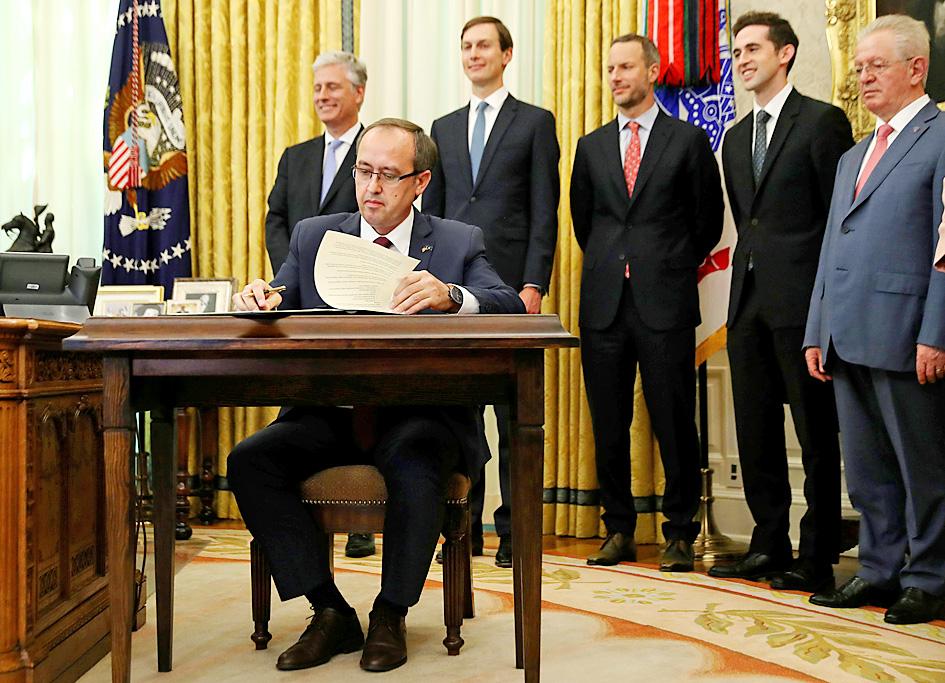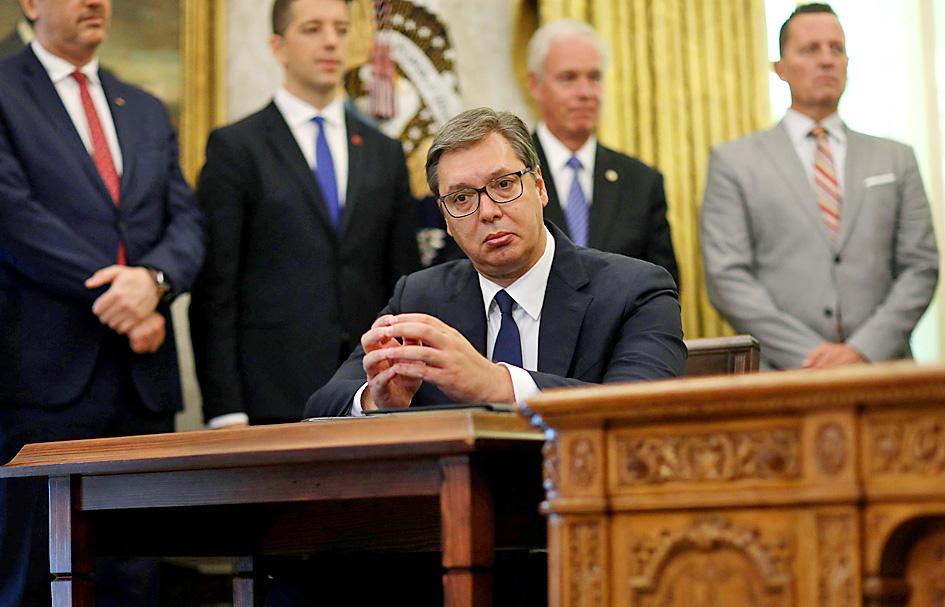Former foes Kosovo and Serbia on Friday agreed to normalize economic relations in a deal brokered by the US, which US President Donald Trump’s administration touted as a major diplomatic success.
The two sides signed a statement in the White House Oval Office committing to a raft of measures to improve transport infrastructure and border crossings, cut trade tariffs, and share energy and water resources, as well as to implement earlier agreements on opening highway and rail links.
They also agreed to improve their relations with Israel. Serbia would move its embassy from Tel Aviv to Jerusalem, while Kosovo, a majority Muslim country, would formally recognize the Jewish state.

Photo: Reuters
In turn, Kosovo, which declared independence from Serbia in 2008, gained formal recognition from Israel.
“A truly historic day,” Trump said, with Kosovar Prime Minister Avdullah Hoti and Serbian President Aleksandar Vucic sitting beside him in the Oval Office. “By focusing on job creation and economic growth, the two countries were able to reach a real breakthrough on economic cooperation across a broad range of issues.”
Trump praised US Special Presidential Envoy for Serbia and Kosovo Peace Negotiations Richard Grenell for bringing the two sides together, two decades after they fought a war that left 13,000 dead.

Photo: Reuters
“It took decades because you didn’t have anybody trying to get it done,” Trump said of the agreement.
“There was a lot of fighting and now there’s a lot of love,” he said. “Economics can bring people together.”
Because they do not formally recognize each other, the two sides appeared to sign parallel statements of intent rather than a formal bilateral agreement, but a Trump administration official stressed that it was a pact between the two sides.
“They have normalized their economic relations,” US National Security Adviser Robert O’Brien said. “The Serbia-Kosovo conflict has gone on for decades. They have been stuck, unable to move forward for many, many years.”
Hoti said that the deal was “a big step” toward the two sides granting each other formal diplomatic recognition.
Serbia has refused to recognize its former territory since Kosovo declared independence.
Although many countries, including the US and European powers, recognize both, Serbian allies China and Russia have withheld their endorsement of the Kosovo state, preventing it from joining the UN.
However, Vucic said that the Serbians had struck a bilateral agreement “with the US,” so that no recognition was given to “third party” Kosovo.
“We will have a common market, no more surprises with the tariffs,” he added.
The agreements include significant help in economic and infrastructure projects from the US Export Import Bank and the International Development Finance Corp.
Hoti put the value of the US support at more than 1 billion euros (US$1.18 billion).
“There is a clear commitment from President Trump and his administration that all these projects begin to be implemented within a year,” Hoti said.

The US government has signed defense cooperation agreements with Japan and the Philippines to boost the deterrence capabilities of countries in the first island chain, a report by the National Security Bureau (NSB) showed. The main countries on the first island chain include the two nations and Taiwan. The bureau is to present the report at a meeting of the legislature’s Foreign Affairs and National Defense Committee tomorrow. The US military has deployed Typhon missile systems to Japan’s Yamaguchi Prefecture and Zambales province in the Philippines during their joint military exercises. It has also installed NMESIS anti-ship systems in Japan’s Okinawa

‘WIN-WIN’: The Philippines, and central and eastern European countries are important potential drone cooperation partners, Minister of Foreign Affairs Lin Chia-lung said Minister of Foreign Affairs Lin Chia-lung (林佳龍) in an interview published yesterday confirmed that there are joint ventures between Taiwan and Poland in the drone industry. Lin made the remark in an exclusive interview with the Chinese-language Liberty Times (the Taipei Times’ sister paper). The government-backed Taiwan Excellence Drone International Business Opportunities Alliance and the Polish Chamber of Unmanned Systems on Wednesday last week signed a memorandum of understanding in Poland to develop a “non-China” supply chain for drones and work together on key technologies. Asked if Taiwan prioritized Poland among central and eastern European countries in drone collaboration, Lin

NO CONFIDENCE MOTION? The premier said that being toppled by the legislature for defending the Constitution would be a democratic badge of honor for him Premier Cho Jung-tai (卓榮泰) yesterday announced that the Cabinet would not countersign the amendments to the local revenue-sharing law passed by the Legislative Yuan last month. Cho said the decision not to countersign the amendments to the Act Governing the Allocation of Government Revenues and Expenditures (財政收支劃分法) was made in accordance with the Constitution. “The decision aims to safeguard our Constitution,” he said. The Constitution stipulates the president shall, in accordance with law, promulgate laws and issue mandates with the countersignature of the head of the Executive Yuan, or with the countersignatures of both the head of the Executive Yuan and ministers or

CABINET APPROVAL: People seeking assisted reproduction must be assessed to determine whether they would be adequate parents, the planned changes say Proposed amendments to the Assisted Reproduction Act (人工生殖法) advanced yesterday by the Executive Yuan would grant married lesbian couples and single women access to legal assisted reproductive services. The proposed revisions are “based on the fundamental principle of respecting women’s reproductive autonomy,” Cabinet spokesperson Michelle Lee (李慧芝) quoted Vice Premier Cheng Li-chiun (鄭麗君), who presided over a Cabinet meeting earlier yesterday, as saying at the briefing. The draft amendment would be submitted to the legislature for review. The Ministry of Health and Welfare, which proposed the amendments, said that experts on children’s rights, gender equality, law and medicine attended cross-disciplinary meetings, adding that